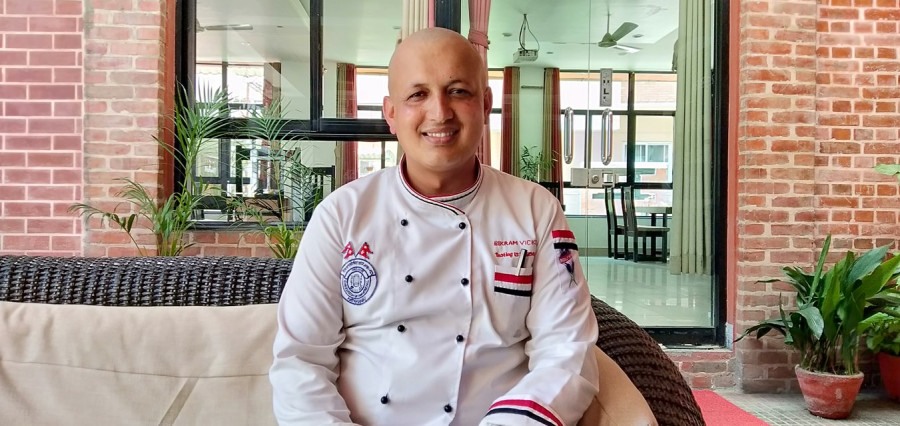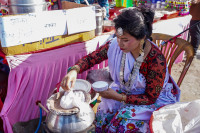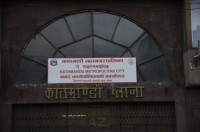Food
Bikram Giri: Restaurants have two options—to close or inject enough funds to keep afloat
Chef Giri shares how he got into cooking, his view on the state of the country’s foodservice industry and what it will take for businesses to get through the lockdown.
Tsering Ngodup Lama
Bikram Giri, chef and general manager of Manny's Eatery & Tapas Bar in Jawalakhel, never intended to become a chef. Growing up, Giri didn't particularly enjoy cooking, and when he started attending culinary classes, he hated it so much, he almost quit. But that was then. Giri has now spent nearly 20 years working in the foodservice industry. But cooking isn't the only thing Giri is known for. He is also known in his industry as the presenter and producer of an online talk show, The Voice of Chefs, which Giri started in 2018 to provide a platform for chefs in the country to share their stories and expertise.
In an interview with the Post's Tsering Ngodup Lama, Giri talks about his culinary journey, society's perceptions of cheffing as a profession, and the challenges the industry is facing due to Covid-19.
What made you get into cooking?
In our family, it was a tradition for the eldest son to join the army. My great grandfather, my grandfather, and father all served in the army. I was supposed to follow in their footsteps, but I never really liked the idea of becoming a soldier; mainly because I didn't like that my father was always away on duty and we never got to spend much time with him. But the problem was I had no idea what else to do with my life. That's where my uncle Narahari Giri came in. He was the one who told me about cooking as a profession and encouraged me to take cooking classes. He even told me chefs led a glamorous life, and that was all it took to convince me. In 2003, I signed up for a six-month culinary training course at Expansion Manpower Training Center, Kathmandu.
But you almost quit your training midway. Why?
Culinary training wasn't easy. It didn't take long for me to realise that cooking as a profession was going to be tough. One day, I even went to my uncle and told him how I was finding the line of work very challenging, and he replied, "Abhi nahin toh kabhi nahin" (If not now then never). For reasons I still don't know, his words stuck in my head, and made me realise that I need to focus on cooking.
Gradually, I started becoming more serious and even started enjoying cooking.
The culinary industry is not known for being kind to newcomers. What was your initial experience in the industry like?
I got my first taste of how the industry was to newcomers when I started my internship at Kathmandu Guest House, one of the leading hotels in the country. It was in 2003. As a trainee chef, I was treated like a second class citizen. On many occasions, I was even bullied, and instead of learning cooking, I spent a lot of my time doing other kitchen work. Back then, people were very secretive with their recipes and didn't share them with newcomers.
Luckily, the commis chef and I became good friends, and he took it upon himself to train me. But the difficult experiences of the initial days also taught me a lot and toughened me up.
Not long ago, cheffing wasn't considered a respectable profession. How do you think the scenario has changed?
When I started this line of work, many friends laughed at my decision. They thought I was stupid. Even my parents weren't very happy about it. I don't blame them because, back then, cooking as a profession was something people did because they had no options. It wasn't deemed a 'respectable' profession. For many years, I hid the fact I cooked to make a living. Such was the taboo associated with the profession. The fact that the pay was paltry didn't help either.
But things have changed. Chefs are no longer looked down upon, and hundreds of youngsters go to culinary schools with hopes of becoming a chef one day. It's also no longer a low-paying job.
In 2018, you started The Voice Of Chefs as a platform to promote Nepali chefs and cuisine. What did you feel the need for such a platform?
As a chef, I have had multiple opportunities to interact with some of Nepal's top chefs. Many of them would share their expertise and experiences with me, which I found very educational. One day, it struck me that if I could create a public platform and bring these experienced chefs to share their stories and knowledge, it would benefit many aspiring chefs. That was the aim behind The Voice of Chefs. So far, I have interviewed more than 100 chefs and promoted several local dishes and cuisines. On the show's first anniversary, we celebrated 27 of Nepal's leading chefs.
You have been in the foodservice industry for almost two decades now. How do you think the industry has improved over the years, and what are the areas you think that need improvement?
Compared to 10 years ago, the industry has improved—a little. The country now has several international chain hotels, and many more are slated to come into operation soon. Another positive sign for the industry is that the culture of dining out is bigger than ever. But all that said, there are still many things lacking in the industry. Even though we have more multiple-star hotels, none of them have good restaurants dedicated to Nepali cuisine.
There's also a dearth of institutions with the infrastructure and manpower needed to train students on authentic Nepali cuisine. And even though we have many great properties, I think they haven't been able to provide young chefs with the platform to learn and excel.
The lockdown has dealt an enormous blow to the country's restaurant industry. How long do you think it will take for the industry to recover?
As early as in January, long before the lockdown started, restaurants and hotels in the country had already started seeing a slump in business. By February, the footfall at restaurants and hotels had become negligible. Many restaurants were already facing trouble paying salaries, rent, and vendors. When the lockdown started, many employed in the sector had already lost their jobs and many were forced to take unpaid leave.
I don’t think smaller restaurants will be able to survive through this. I believe it will take another few years for the industry to fully recover because even if the lockdown is lifted, I don’t think people will feel comfortable going out where you’d expect crowds. In the current scenario, business owners have two options—to close their businesses or inject enough funds to keep them afloat and wait for things to get back to normal.




 14.24°C Kathmandu
14.24°C Kathmandu










